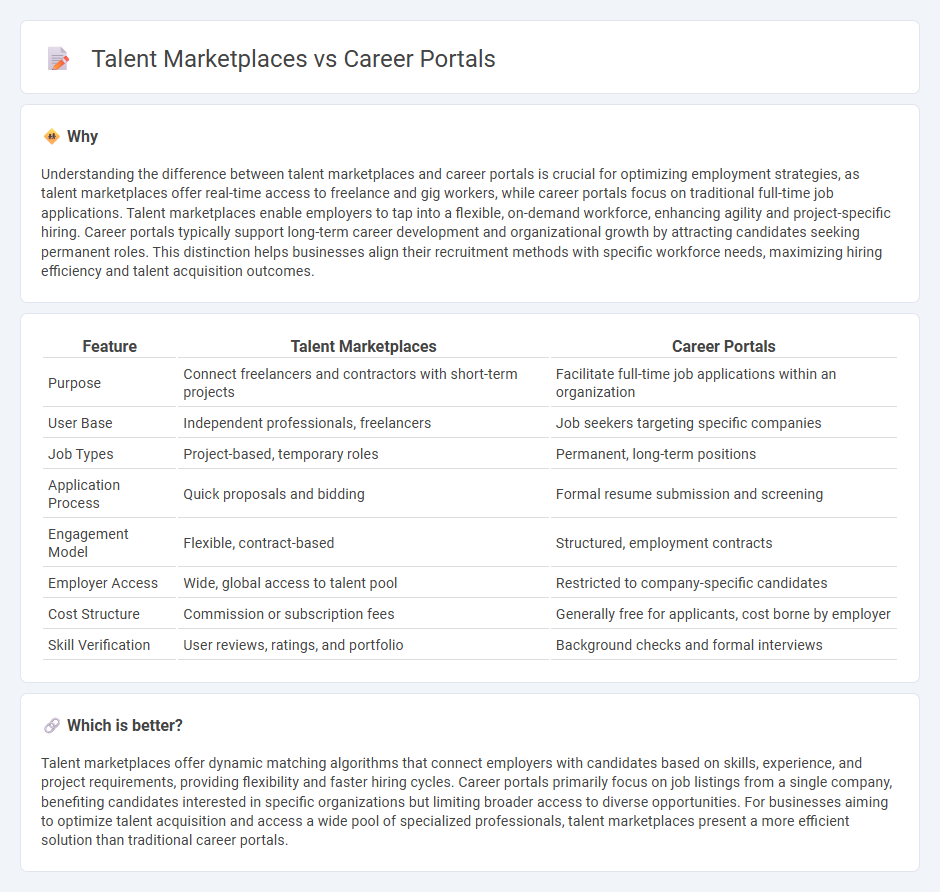
Talent marketplaces connect employers with freelance and contract professionals offering flexible, project-based work opportunities, utilizing advanced matching algorithms to optimize skill fit and availability. Career portals serve as traditional job boards, primarily listing permanent full-time positions and facilitating direct applications for various industries and experience levels. Discover how these platforms can transform your hiring or job search strategy.
Why it is important
Understanding the difference between talent marketplaces and career portals is crucial for optimizing employment strategies, as talent marketplaces offer real-time access to freelance and gig workers, while career portals focus on traditional full-time job applications. Talent marketplaces enable employers to tap into a flexible, on-demand workforce, enhancing agility and project-specific hiring. Career portals typically support long-term career development and organizational growth by attracting candidates seeking permanent roles. This distinction helps businesses align their recruitment methods with specific workforce needs, maximizing hiring efficiency and talent acquisition outcomes.
Comparison Table
| Feature | Talent Marketplaces | Career Portals |
|---|---|---|
| Purpose | Connect freelancers and contractors with short-term projects | Facilitate full-time job applications within an organization |
| User Base | Independent professionals, freelancers | Job seekers targeting specific companies |
| Job Types | Project-based, temporary roles | Permanent, long-term positions |
| Application Process | Quick proposals and bidding | Formal resume submission and screening |
| Engagement Model | Flexible, contract-based | Structured, employment contracts |
| Employer Access | Wide, global access to talent pool | Restricted to company-specific candidates |
| Cost Structure | Commission or subscription fees | Generally free for applicants, cost borne by employer |
| Skill Verification | User reviews, ratings, and portfolio | Background checks and formal interviews |
Which is better?
Talent marketplaces offer dynamic matching algorithms that connect employers with candidates based on skills, experience, and project requirements, providing flexibility and faster hiring cycles. Career portals primarily focus on job listings from a single company, benefiting candidates interested in specific organizations but limiting broader access to diverse opportunities. For businesses aiming to optimize talent acquisition and access a wide pool of specialized professionals, talent marketplaces present a more efficient solution than traditional career portals.
Connection
Talent marketplaces and career portals are interconnected platforms that streamline the hiring process by matching skilled candidates with relevant job opportunities through advanced algorithms and data analytics. These systems enhance talent acquisition efficiency by providing employers with access to a diverse pool of qualified professionals while offering job seekers personalized job recommendations based on their skills and preferences. Integration of AI-driven tools in both talent marketplaces and career portals accelerates recruitment cycles and improves candidate-employer alignment, leading to higher employment success rates.
Key Terms
Job Listings vs. Gig Listings
Career portals primarily emphasize job listings designed for full-time, part-time, and contract positions within established companies, catering to long-term employment opportunities. Talent marketplaces focus on gig listings, offering short-term, freelance, or project-based work that connects skilled professionals with businesses seeking specific expertise on demand. Explore the distinctions further to determine which platform aligns best with your hiring or job-seeking needs.
Employer Branding vs. Freelancer Profiles
Career portals emphasize enhancing employer branding by showcasing company culture, values, and job opportunities to attract top talent. Talent marketplaces prioritize freelancer profiles, highlighting individual skills, experience, and ratings to facilitate project-based hiring. Discover the key differences to optimize your recruitment strategy effectively.
Direct Applications vs. Bidding Systems
Career portals emphasize direct applications, allowing candidates to submit resumes and cover letters straight to employers, streamlining the hiring process with clear job postings and application tracking systems. Talent marketplaces operate on bidding systems where freelancers or contractors propose project bids, enabling dynamic price competition and project-based engagement tailored to specific skills. Explore more to understand which platform best suits your hiring or job search strategy.
Source and External Links
Career Portal Jobs on Indeed - Lists thousands of job opportunities across various fields, including healthcare and technology.
Meta Careers - Offers career opportunities in AI, metaverse, and wearables, focusing on innovation and collaboration.
CareerOneStop GetMyFuture Portal - Provides resources for career exploration, training, and job search assistance for young adults.
 dowidth.com
dowidth.com